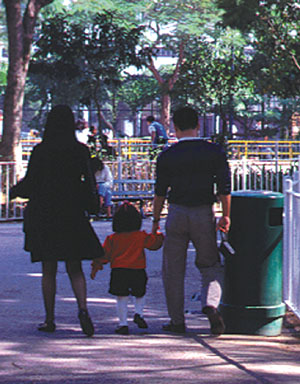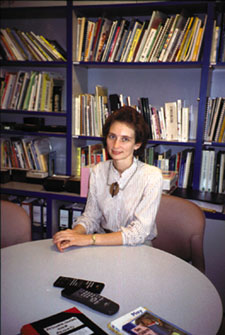 Hospital life
Hospital lifeKids now get special care
By Fanny Lee
Nicholas Chow, 9, felt bored when he was put into hospital 2 years ago. There were neither toys nor playmates around. Worse still, the nurses were harsh. He missed his mother and hoped to go home as quickly as possible. Luckily, his hospital stay lasted only two weeks.
For children who need long term hospitalisation, the unfamiliar hospital environment is more difficult to cope with than it is for adults.
According to Dr. Patrick Yuen of the Prince of Wales Hospital, children are especially vulnerable.
He said, "They are afraid of being different from the others."
Ms Yvonne Becher, the hospital play manager for a local volunteer group, Playright, said long term hospital experiences may be detrimental to a child's future development.
"As the children are suddenly transferred to a new environment, they are separated from their parents," she said. "Therefore, they may be frightened by the hospital procedures."
According to Dr. Yu Chak Man of Princess Margaret Hospital, a children's hospital, which is common in Western countries, may help.
"However, many people think that this would be unsuitable for Hong Kong," he said.
Ms Becher regarded cultural beliefs as one of the reasons for this. Said she: "A hospital is a serious place, not a place for children to play in.
"Also, there is a shortage of professionally trained staff to carry out such changes to general hospitals for children," she added.
Dr. Yuen attributed the causes to the particular situation in Hong Kong.
"Resources are limited and transportation here is inconvenient. Where should we put it? On Hong Kong Island or in the New Territories?
"Instead, transformations (of wards) in different hospitals is preferred," he said. Princess Margaret Hospital is among the first to carry out a campaign to reform the paediatric wards.

|
| Playright's Ms Yvonne Becher |
Under the scheme, volunteers recruited abroad helped to paint the wards in rainbow colours. Moreover, the little patients' uniforms were specially redesigned to make them more casual. This was a breakthrough from the boring and traditional orange. "Children in a relaxing environment can recover faster since stress is reduced," said Dr. Yu.
With the help of Playright's play specialists, the hospital also teaches children about hospital procedures in an easily understood manner.
They try to help hospitalized kids to lead normal lives through playing games. Medical models and a mini X-ray set, for example, are used to teach children about medical procedures in a simple way.
Ms Becher said playing can give emotional support to children and help them regain skills lost as a result of long term hospitalization.
"For example, we give the children a sense of self-control through doing arts and crafts. Hence, they know they are capable of doing something, in spite of their illness."
The children in the hospital are allowed to decorate the corners around their beds. It is hoped this will give them privacy, as if they are at home.
Apart from Princess Margaret Hospital, some other organisations are devoted to the well-being of children in hospitals.
The aim of Red Cross Hospital Schools is to provide education to physically and mentally ill children. This helps them catch up with schoolwork after being discharged.
Extracurricular activities are jointly organized by hospitals and schools. Day camps, visits, "games days" and parties are used to keep children in touch with social life.
While children are hospitalized, family members are usually under stress because of their need to offer comfort while trying to manage their normal day-to-day affairs at the same time.
To stay at the children's bedsides, some parents and relatives are permitted to sleep overnight in hospital corridors and even on floors.
A novel solution for stressful parents at Prince of Wales Hospital is the Ronald McDonald House in Sha Tin.
 The House enables family members of child patients to live as normally as they would at home while their sick children are in the hospital.
The House enables family members of child patients to live as normally as they would at home while their sick children are in the hospital.
The 20-bedroom house is expected to serve 1,400 families each year. A recreation room, a library and a common room are provided. Besides, a garden in the central court yard of the house allows the guests to relax.
Sharing among parents living in the House is important. Said Miss Angela Ho, the house manager: "Mental support is acquired through mutual communication." Families have to pay $50 each night. However, those who cannot afford the price are exempted, depending on their situation.
The House till now has been run mostly by volunteers. Miss Ho is the first full time employee of the House.
"People are enthusiastic to help," she said. "Volunteers come from all walks of life, including lecturers, bankers, and even villagers living nearby."
Although the house is the first one in Asia, its appearance in the Territory lags behind its appearance in the U.S. by 22 years.
"It is mainly about land, capital and volunteers. Besides, nobody had thought of initiating one," said Miss Ho.
The land was granted by the government, and capital was provided by many organizations as well as though fund raising schemes.
The Ronald McDonald House in Hong Kong is different from those with similar functions in the U.S. In the States, children and parents are allowed to stay in the same hostel so that it is more like home. Parents and children are separated in Hong Kong, however.
Unfortunately, to some parents, it is intolerable to leave their children for even a minute.
Said a mother whose 4-year-old son is living in the Prince of Wales Hospital: "I feel worried about letting the hospital take care of my son. It is also a burden to the hospital staff. I would rather teach him and talk to him myself."
She thinks the Ronald McDonald House "may not be useful" for her.
"My son wants me around for 24 hours. For those who live nearby, they don't need the hostel."
A pair of parents whose 9-year-old daughter has blood cancer shared this view. They said that family ties cannot be replaced. In order to accompany their child, they would rather abandon their jobs and stay in the hospital.
With red eyes, the mother said, "Everything is unimportant as long as she gets well soon."

January 1997
Return to contents
